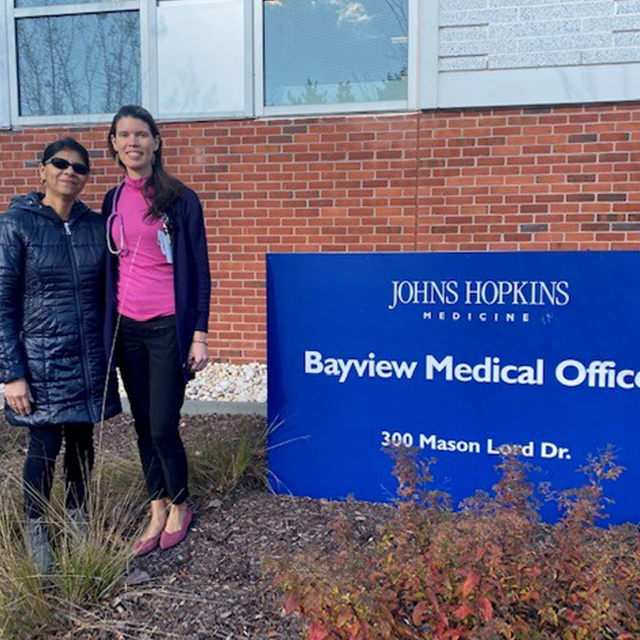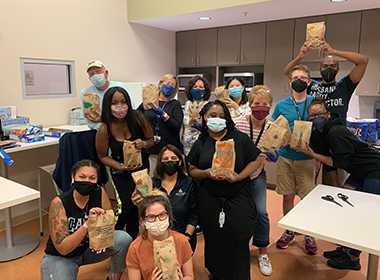Every month, Hopkins Community Connection program coordinator Joy Scalabrin drives to ShareBaby, an organization that provides diapers and other baby-related items to families throughout Baltimore. Scalabrin stuffs thousands of diapers and supplies into her small SUV to distribute to the community, ensuring Johns Hopkins Medicine patients have the essentials to care for their families.
“Our collaboration with ShareBaby enables us to address such a critical need for our patients and families in the moment,” says Kristin Topel, Hopkins Community Connection’s executive director. “When we ask our families if they have enough food to eat, diapers for their child, or transportation to important appointments, it’s vital we have the resources to connect them to at that time. Collaborations like this help us create a trusted and safe medical organization that supports the whole health of families.”
Hopkins Community Connection (HCC) has been a part of Johns Hopkins Medicine for over 15 years. Formerly called Health Leads, the organization is stationed in Johns Hopkins clinics and affiliated outpatient locations, including the Harriet Lane Clinic, East Baltimore Medical Center, Johns Hopkins Outpatient Center, and the Comprehensive Care Practice and Children’s Medical Practice at Johns Hopkins Bayview Medical Center. HCC has a desk at each site, and 150 undergraduate Johns Hopkins University student volunteers and community health workers screen patients for the social determinants of health.
“This screening is just as important as height and weight,” Topel says. “We find out what resources our patients would like and support them through the referral process. The volunteers follow up every week to help patients navigate the requirements and logistics of community programs. We’re providing whole-person health care.”
HCC serves nearly 4,000 families a year through grants as well as financial support from Johns Hopkins and affiliated outpatient clinics. Through collaborations with organizations like ShareBaby, HCC can provide tangible goods to patients. That assistance often makes it more likely that the patients will continue to work with HCC.
Valencia Hike, ShareBaby’s program director, says the organization provides baby essentials to families throughout Baltimore City. Diapers and other necessities are purchased and gathered through public and private grants, corporate and individual donations, and community drives.
“We have found that diapers are a large expense to our families,” Hike says. “If we can help put that income back into their household, they can pay for other necessary things.”
Hike says HCC has been an extremely reliable affiliate, and it has been a joy to work with the HCC team.
“It’s nice to be able to reach out and know that they’re going to be responsive,” Hike says. “We can wholeheartedly depend on them to get the necessary items out to families.”
Scalabrin, who started as an HCC volunteer, now works at the East Baltimore Medical Center desk. She says that if a patient expresses that they need diapers, HCC can provide 50 diapers per month in packs of 25 per patient.
“This is a place where patients know they can come regularly and get help,” Scalabrin says. “It’s an opportunity to build relationships with our neighbors and help people access resources with fewer barriers or obstacles. We’re creating a space where people feel comfortable seeking help navigating complicated resources and processes.”
HCC case manager Isabel Abaunza says providing diapers and other essentials to families definitely helps her patients.
“I work with the Latino community because of where we’re located,” Abaunza says. “Most patients speak Spanish. I’ve seen that our patients are connecting in our clinic and supporting each other. We get a lot of referrals that way.”
Rama Imad, HCC’s program coordinator at the Harriet Lane Clinic, says she’s grateful that HCC can provide essentials like diapers, formula, winter coats and feminine products.
“It’s exciting to see how we’re able to collaborate with organizations to care for each other,” Imad says. “We’re making sure all patients are addressing their social needs and can access all the resources they’re eligible for equitably.”
Like Scalabrin, Imad was an HCC volunteer before taking a job as a staff member.
“I’ve gotten to know our patients and their stories,” Imad says. “They are dealing with life, just like the rest of us. It makes me look at the system differently, and encourages me to try to change it, so it works for everyone.”



